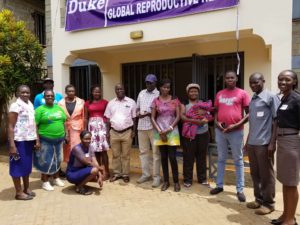The Center for Global Reproductive Health’s Research Coordinator, Yujung Choi, and I held a dissemination meeting on October 19th to share the findings from one of our studies. The study describes the characteristics, motivations, and experiences of community health volunteers (CHVs) in Kisumu county, and looks to understand CHV knowledge and self-efficacy of reproductive health counseling and services. The purpose of the meeting was to share the study outcomes with key stakeholders and elicit feedback in order to inform future interventions to measure CHV performance and increase CHV retention rates. Among those who attended the meeting were CHV supervisors who had participated in the study, Sub-County Community Health Strategy Focal Persons, a former study staff, and a Program Officer from the NGO Community Initiatives Concerns.
We summarized the study findings on various topics, including:
-CHVs’ reasons for becoming CHVs
-CHV level of comfort in teaching health topics such as family planning
-child care and nutrition
-HIV, malaria, and cervical cancer
-challenges in carrying out daily tasks
-relationship quality with supervisors
-rewarding experiences at work

Overall, the meeting was successful in providing a deeper understanding of the challenges that CHVs face daily, as observed by CHV supervisors at the sub-county level. The participants of the meeting echoed many of the concerns that the CHVs had brought to attention. During the last half of the meeting, group discussions with two participants per group were held. Each group was assigned a theme based on the challenges recalled by the current and former CHVs as well as CHV supervisors who had participated in the study. The three themes that we focused on were:
-how to ensure sustainability of CHVs’ work after NGOs/partners leave
-skills to handle the community’s misconception regarding how their data will be used
-how to improve education/training for CHVs on health topics that are challenging to discuss
This interactive group session generated productive discussions on strategies for reducing some of the identified challenges going forward. We hope that they will provide guidance to improve CHV workflow, satisfaction, and retention rates, which will in turn improve quality of care for women.

